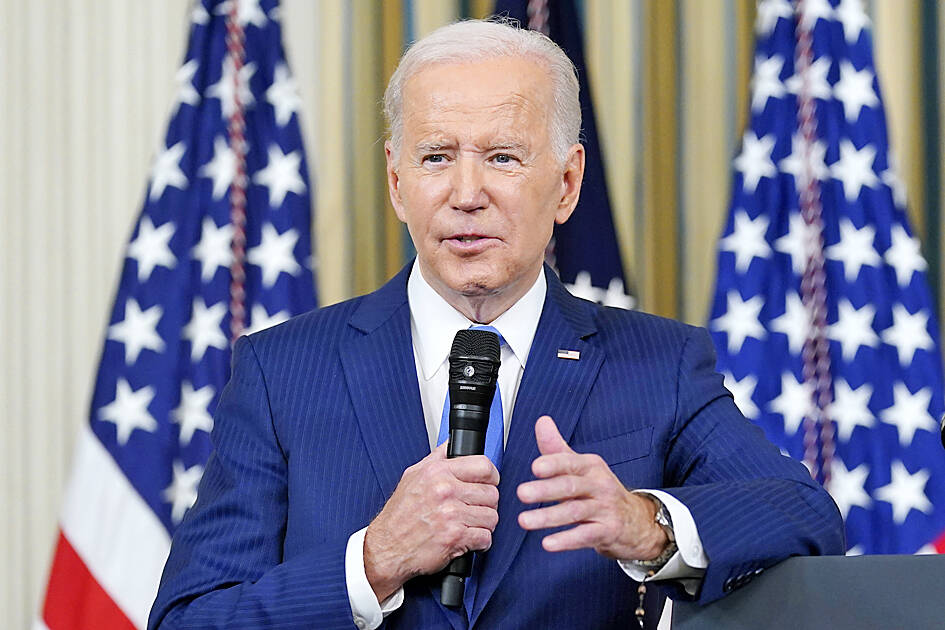US President Joe Biden’s administration has added 37 companies from China’s mining, solar and textile sectors to its list of those banned from exporting to the US due to alleged forced labor practices in the Xinjiang region.
The firms include mining giant Zijin Mining Group (紫金礦業) and solar companies such as a subsidiary of JA Solar Technology Co (晶澳太陽能科技), a statement from the US Department of Homeland Security said.
The list also includes textile manufacturer Huafu Fashion Co (華孚時尚) and 25 of its subsidiaries.

Photo: AP
US and European companies have been under pressure to pull away from factories that make clothes and other products in the Xinjiang region. Labor groups have documented alleged forced labor camps and other poor working conditions involving the local Uighur population. China disputes these claims.
The additions represent the largest single expansion of the Uyghur Forced Labor Prevention Act list since the law was passed in 2021, and bring the total number of companies banned to 144, the statement said.
Major Chinese solar companies have already started switching to more expensive polysilicon from Western countries to eliminate risks linked to the law and import ban. As for JA Solar, the impact of its addition to the US list is expected to be limited as the subsidiary closed last year and did not supply directly or indirectly to the US, a note by BofA Global Research said.
“That said, this serves another reminder that Chinese solar will face rising trade headwinds especially in the US,” BofA Global said.

NEW IDENTITY: Known for its software, India has expanded into hardware, with its semiconductor industry growing from US$38bn in 2023 to US$45bn to US$50bn India on Saturday inaugurated its first semiconductor assembly and test facility, a milestone in the government’s push to reduce dependence on foreign chipmakers and stake a claim in a sector dominated by China. Indian Prime Minister Narendra Modi opened US firm Micron Technology Inc’s semiconductor assembly, test and packaging unit in his home state of Gujarat, hailing the “dawn of a new era” for India’s technology ambitions. “When young Indians look back in the future, they will see this decade as the turning point in our tech future,” Modi told the event, which was broadcast on his YouTube channel. The plant would convert

‘SEISMIC SHIFT’: The researcher forecast there would be about 1.1 billion mobile shipments this year, down from 1.26 billion the prior year and erasing years of gains The global smartphone market is expected to contract 12.9 percent this year due to the unprecedented memorychip shortage, marking “a crisis like no other,” researcher International Data Corp (IDC) said. The new forecast, a dramatic revision down from earlier estimates, gives the latest accounting of the ongoing memory crunch that is affecting every corner of the electronics industry. The demand for advanced memory to power artificial intelligence (AI) tasks has drained global supply until well into next year and jeopardizes the business model of many smartphone makers. IDC forecast about 1.1 billion mobile shipments this year, down from 1.26 billion the prior

People stand in a Pokemon store in Tokyo on Thursday. One of the world highest-grossing franchises is celebrated its 30th anniversary yesterday.

Zimbabwe’s ban on raw lithium exports is forcing Chinese miners to rethink their strategy, speeding up plans to process the metal locally instead of shipping it to China’s vast rechargeable battery industry. The country is Africa’s largest lithium producer and has one of the world’s largest reserves, according to the US Geological Survey (USGS). Zimbabwe already banned the export of lithium ore in 2022 and last year announced it would halt exports of lithium concentrates from January next year. However, on Wednesday it imposed the ban with immediate effect, leaving unclear what the lithium mining sector would do in the